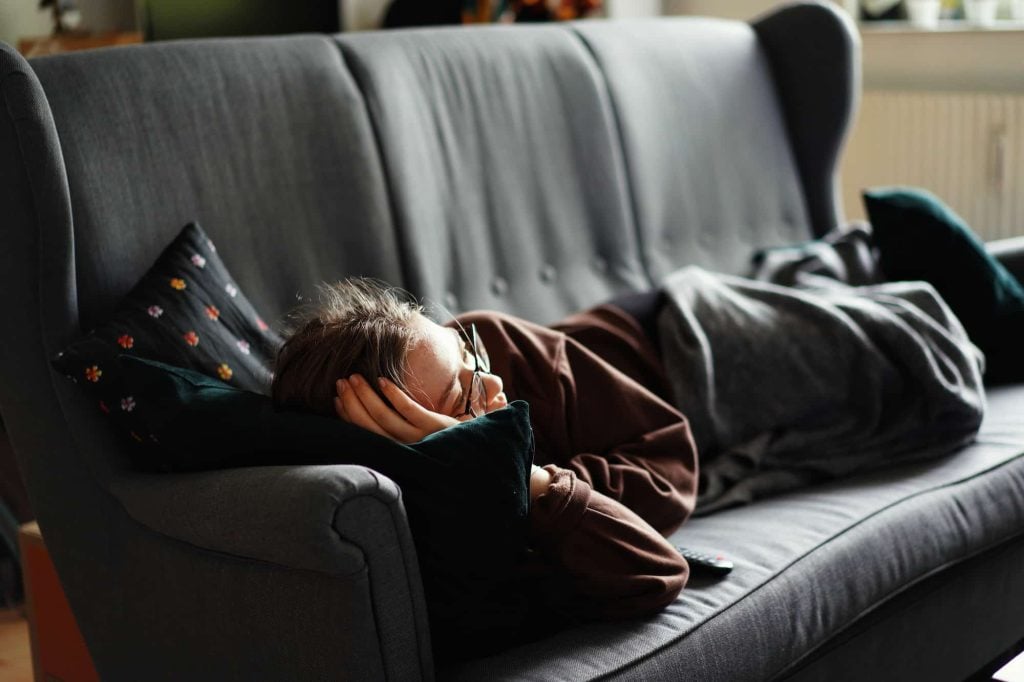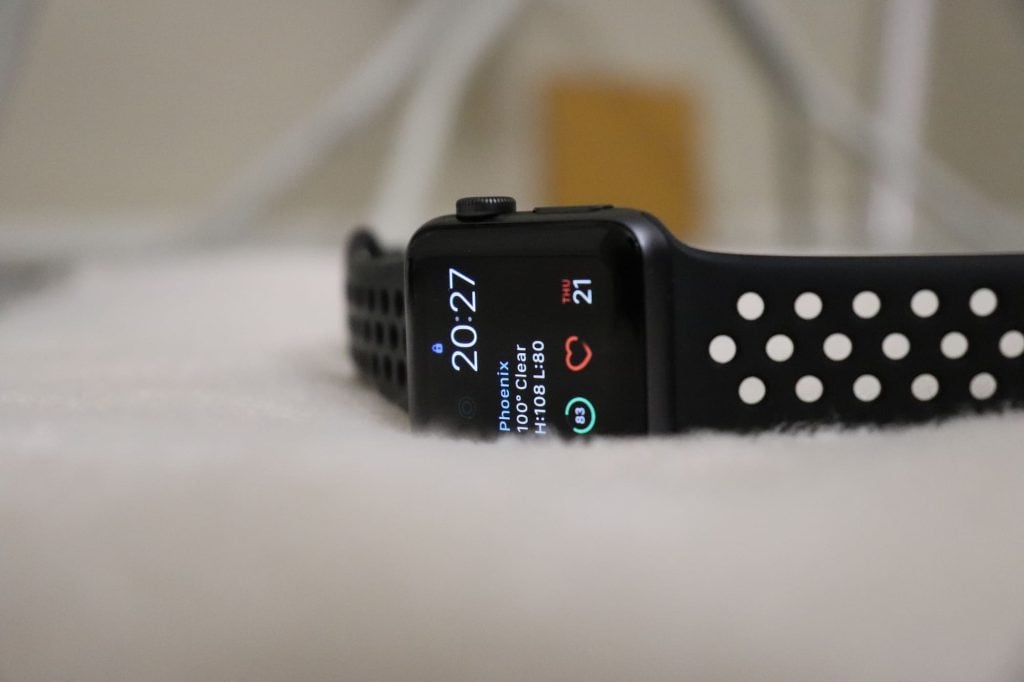In humans, a low heart rate is a sign of good health. Throughout the day, our heart rates fluctuate depending on what we’re doing, with strenuous activities such as weightlifting, cardio and exercise, in general, causing our heart rates to increase.
At nighttime, our heart rates typically descend as we relax into the night, but sometimes this isn’t always the case. Not only can a thumping heart be uncomfortable, but it can also cause severe pain, especially when trying to sleep.
So, what is a good resting heart rate? And how do we reduce our heart rate when sleeping? In celebration of National Heart Month in the UK, here are seven relaxing ways of slowing your heart rate before bed for a better night’s sleep.
 The ideal heart rate when sleeping
The ideal heart rate when sleeping
For adults, a good resting heart rate resides somewhere around the 60-100 bpm (beats per minute) margin. A lower heart rate means your heart isn’t tiring itself out trying to pump blood all over your body, significantly reducing the risk of coronary-related health issues.
People with good resting heart rates tend to be very active and energetic. For example, the average person has a resting heart rate of around 80 bpm, whereas the heart rate of a professional athlete can be as low as 40 bpm. This is because their hearts are much stronger and better able to pump blood with each beat.
In addition to the risk of coronary-related health issues, there are various other reasons why a normal resting heart rate is important. The more beats your heart has to take on a regular basis, the more strain it places on your heart over time; factors such as a healthy diet, a good night’s sleep and getting into the practice of relaxation techniques are simple yet effective ways in which you can improve or maintain your heart health.
In regard to mental health, there is also a correlation between high heart rates and increased risks of obsessive-compulsive disorder, anxiety disorder and schizophrenia. Please note that Mattressman are not medical experts and if you believe your heart rate is impacting your heath, please seek medical attention immediately.
Typically, a normal sleeping heart rate for adults resides at the lower end of the average daily heart rate.
It’s difficult to determine an average sleeping heart rate as, when we sleep, it’s quite normal for our heart rates to be anywhere within the suggested range. Sometimes, it can go even lower than this, particularly during deep sleep amidst REM (repetitive eye movement) cycles.
It’s worth noting that during REM sleep, our heart rates and blood pressure can also go up – during a nightmare, you may wake up in a pool of sweat while your heart is racing. As such, it’s quite hard to point towards a ‘normal’ heart rate when sleeping, as this can change drastically through the night.
 A watch device to measure heart rate while sleeping
A watch device to measure heart rate while sleeping
Please note that if you’re continuously struggling with a high heart rate, one of the first things we recommend is to consult a qualified medical professional such as your GP. High heart rates could be signs of serious health conditions, especially if they consistently cause physical distress.
If you find your heart rate is keeping you awake, there are some things that can be done to help you relax:
Put down your phone, turn off any screens and cast your eyes to the welcoming sight of a soothing story. Books are a great tool to help us slow down and take stock, especially ones with heart-warming, relaxing stories.
Just be sure to avoid any crime, horror or thrillers, as these could have the opposite effect.
The calming benefits of Yoga are already well known. Not only does Yoga boost our physical strength, but it can also be extremely relaxing.
There are some Yoga poses that can be done from the top of our beds. When doing bedtime Yoga, memory foam mattresses are incredibly beneficial, as they will allow you to sink into a comfortable resting position without having to move your body during a pose, much like a traditional Yoga mat.
Positions like the Supine Spinal Twist, the Head-to-knee Forward Bend, and Butterfly Pose all are all great candidates, as they require no extra equipment and are all focused on relieving physical and mental stress.
Some drinks that are usually associated with relaxation actually contain traces of caffeine, with tea being one of the worst offenders.
Tea is a very common afternoon-evening drink. But some types of tea have been shown to contain similar amounts of caffeine to a small cup of coffee. An average (230 ml) cup of coffee contains around 90 mg of caffeine, which is around 22% of our recommended maximum caffeine intake. An average cup of green tea contains around 40mg of caffeine.
Despite the amount of caffeine being under half that of coffee, drinking two or three cups of tea before bed can quickly add up over the course of one evening. After all, caffeine has various effects on the body, the most prominent of which is an increased heart rate.
Although a nice cup of tea might be just the ticket before bed, you may want to consider cutting this British staple out of your bedtime routine if you find yourself with a high heart rate at night.
When our heart rates go up, we begin to panic. Sometimes it’s for seemingly no reason at all, which subsequently leads to confusion and even more panic. There are various breathing exercises for sleep that also help with many problems like panic attacks. These drills also have the added benefit of slowing down our hearts.
For a quick and easy fix, try this 10-second routine: inhale through the nose and fill up your lungs to full capacity while counting to five. After this, slowly exhale through your mouth while still counting to five. After a few passes, your heart rate and stress levels will begin to reduce.
There’s nothing more infuriating at bedtime than a room that’s either too hot or too cold. Sometimes, not even the ‘one leg out’ trick can save us, which is why it’s so important to pay attention to your rooms ability to control heat.
When we’re too hot, we begin to sweat. This causes our heart to beat faster while it supports our cardiovascular system trying to cool us down. The same thing happens when we’re too cold.
One great way of manipulating your body’s temperature during sleep is to use a breathable mattress. The Cool Pocket 1000 for example features two sides: one of which is traditional memory foam to keep you warm in the winter, and the other has a cool fabric cover for use in the summer. If you’re too hot (or too cold) simply flip the mattress around for quick relief.
This may sound counterproductive, as exercise overall has been shown to significantly reduce our heart rates in the long term. However, it’s important to not exercise just before bed. Some may think of exercise as a quick way to tire us out before sleep, but in almost every instance, this can actually have the opposite effect.
This can be avoided by setting up an exercise schedule that ends at a specific time. This routine will not only prevent your rising heart rate before bed, it will also give a more consistent workout regime moving forward.
The dreaded midnight snack. We’ve all been there, you’re lying in bed struggling to sleep when all of a sudden, hunger strikes. Suddenly you’re downstairs raiding the cupboards for a quick and easy hunger fix before walking back up to bed only to find that our energy levels have spiked, and the cycle continues.
Eating food causes changes in our blood flow, which subsequently leads to a higher heart rate. Some foods are worse for this than others. Spicy foods for example can cause heartburn, a painful condition that causes us to panic and experience major discomfort.
Although it might sound difficult, the best thing you can do for your heart rate before bed is to try and avoid eating beyond a certain time. This does depend on the time you go to bed, but a good rule of thumb is to avoid food within three hours of sleeping. This creates a barrier between when your body begins to digest food, and when it shuts down for sleep.
So, there you have it. With these tips you’ll be well on your way to cutting down on your heart rate before bed and enjoying a full night’s sleep without discomfort.
By far the best way to improve your quality of sleep is to invest in a comfortable mattress. With Mattressman’s wonderful and affordable mattress range, better sleep is within easy reach. If you’re not sure which one is best for you, contact us and our team will be sure to help.